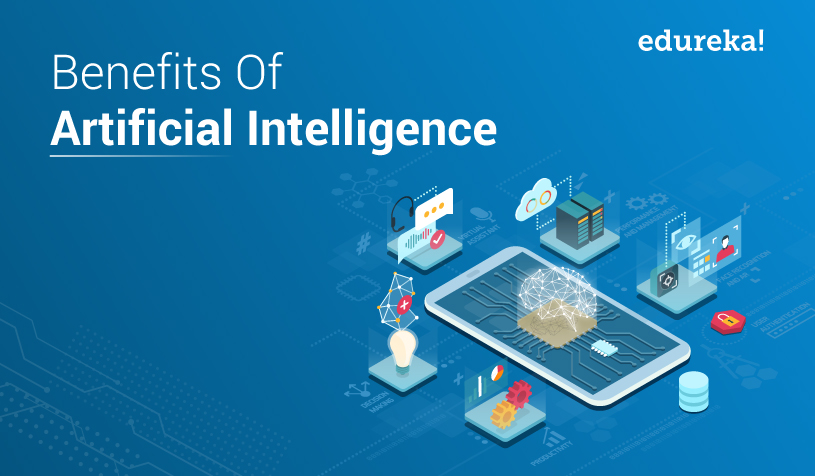The Power of Artificial Intelligence
Artificial Intelligence (AI) has emerged as a transformative force, revolutionizing industries and redefining the way we approach challenges. In this exploration, we delve into the myriad benefits that AI brings to the table, shaping a future where intelligence is not just human but artificial too.
Streamlining Operations for Enhanced Efficiency
In the ever-evolving landscape of technology, AI stands out as a key player in streamlining operations. The infusion of artificial intelligence into workflows brings about unparalleled efficiency gains. Tasks that were once time-consuming and mundane are now automated, allowing businesses to focus on what truly matters.

Improved Decision-Making: The AI Advantage
A hallmark benefit of AI lies in its ability to process vast amounts of data and derive meaningful insights. This capability translates into improved decision-making across various domains. Businesses leverage AI-driven analytics to make informed choices, steering away from reliance on gut feelings to data-backed strategies.
Revolutionizing Industries with Artificial Intelligence
The transformative impact of Artificial Intelligence extends across diverse industries, ushering in unprecedented advancements. Here, we explore how AI is revolutionizing key sectors, shaping a future where innovation is synonymous with artificial intelligence.
Healthcare Advancements: A New Era of Diagnosis and Treatment
In the realm of healthcare, AI is a game-changer. From diagnostic tools powered by machine learning algorithms to personalized treatment plans, artificial intelligence is enhancing patient care and outcomes. Discover the revolutionary strides AI is making in the medical field.
Transforming Education: AI’s Role in Learning
Education undergoes a paradigm shift with the integration of AI. Personalized learning experiences, adaptive assessments, and intelligent tutoring systems are reshaping the way students engage with knowledge. Explore the benefits that AI brings to the forefront of education.
AI in Business: Boosting Engagement and Driving Innovation
Artificial Intelligence isn’t confined to specific sectors; it’s a driving force in reshaping how businesses operate. In this section, we uncover the ways AI is enhancing customer engagement and fostering innovation in the business landscape.
Boosting Customer Engagement: The Role of AI-Driven Interaction
AI-powered chatbots, recommendation engines, and personalized interactions redefine the customer experience. Discover how businesses leverage artificial intelligence to create seamless and engaging customer interactions, ultimately enhancing customer satisfaction.
Driving Innovation: AI’s Impact on Business Models
Innovation is at the core of AI integration. From product development to reimagining entire business models, artificial intelligence is a catalyst for transformative change. Explore how businesses harness the power of AI to stay at the forefront of innovation.
Addressing Challenges: Ethical Considerations and Overcoming Barriers
While the benefits of AI are substantial, it’s essential to navigate challenges ethically and strategically. In this segment, we explore the ethical considerations associated with AI and strategies to overcome barriers hindering its widespread adoption.
Ethical Considerations in AI: Mitigating Bias and Ensuring Responsibility
As AI becomes ingrained in decision-making processes, addressing ethical concerns becomes paramount. Dive into the discussion on mitigating bias in AI algorithms and ensuring responsible AI development practices to maintain trust and fairness.
Overcoming Barriers: Strategies for Seamless AI Adoption
Despite the transformative potential, certain barriers impede the seamless adoption of AI. Explore strategies to overcome challenges related to workforce concerns, regulatory issues, and other factors hindering the integration of AI into various sectors.
Frequently Asked Questions About Artificial Intelligence
1. What is Artificial Intelligence (AI)?
AI refers to the development of computer systems capable of performing tasks that typically require human intelligence, such as learning, reasoning, problem-solving, and perception.
2. How does AI streamline operations in businesses?
AI streamlines operations by automating repetitive tasks, optimizing workflows, and providing data-driven insights, leading to enhanced efficiency and productivity.
3. What role does AI play in healthcare?
AI in healthcare involves diagnostic tools, personalized treatment plans, and predictive analytics, significantly improving patient care, diagnostics, and outcomes.
4. Can AI be applied in education?
Yes, AI is transforming education through personalized learning experiences, adaptive assessments, and intelligent tutoring systems, catering to individual student needs.
5. How does AI boost customer engagement in business?
AI-driven chatbots, recommendation engines, and personalized interactions enhance customer engagement, providing seamless and tailored experiences.
6. What ethical considerations are associated with AI?
Ethical considerations in AI involve mitigating bias in algorithms, ensuring responsible AI development, and addressing privacy concerns to maintain fairness and trust.
7. What challenges hinder the adoption of AI?
Challenges include workforce concerns, regulatory issues, and the need to overcome biases, all of which require strategic approaches for seamless AI adoption.
8. What are the emerging trends in AI?
Emerging trends in AI include advancements in natural language processing (NLP), increased focus on edge computing, and the integration of AI into various industries.
9. What are the societal implications of widespread AI adoption?
Societal implications include discussions on privacy, job displacement, and the ethical use of AI, emphasizing the need for a balanced and responsible approach.
10. How can businesses stay ahead in the AI landscape?
Staying ahead involves staying informed about emerging trends, embracing responsible AI practices, and considering the broader societal implications for ethical decision-making.
Conclusion:
As we conclude our journey through the benefits of artificial intelligence, it’s clear that AI is more than a technological advancement; it’s a catalyst for transformative change. From streamlining operations to revolutionizing industries, the potential of AI is vast.
In this ever-evolving landscape, it’s crucial to embrace AI responsibly. As we witness its rapid integration into our daily lives, striking a balance between progress and ethical considerations becomes imperative. The future holds promise, and how we navigate the AI landscape will shape the course of innovation and societal development.




